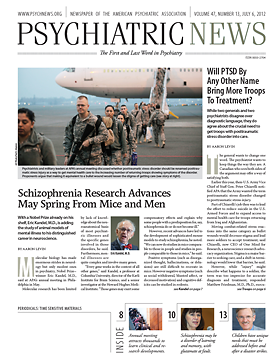Pharmacogenetics may soon diminish the trial-and-error process of determining which medication will work best for a patient with bipolar disorder.
That’s the hope of John Kelsoe, M.D., a professor of psychiatry with the Laboratory of Psychiatric Genomics in the Department of Psychiatry at the University of California, San Diego. Kelsoe directs the Bipolar Genome Study (BiGS), a 13-site consortium focused on identifying genes for bipolar disorder and their relationship to clinical symptoms. He also co-directs the Psychiatric GWAS Consortium for Bipolar Disorder (PGC-BD), an international collaborative effort designed to identify genes for bipolar disorder in a sample of over 10,000 patients.
Kelsoe spoke at APA’s 2012 annual meeting in Philadelphia in May as part of the “Research Advances in Psychiatric Pharmacogenomics” symposium, discussing his work on advances in the pharmacogenetics of lithium response in the search for a personalized treatment of bipolar disorder.
“It’s long been an observation that there’s a subset of individuals who have a fantastic response to lithium,” he said. “They are essentially cured … as long as they stay on their medication. So it’s been disturbing to me to see lithium fall to the wayside as other medications have come along. I’m concerned there are lots of patients who will miss the opportunity to find out if they are one of these excellent lithium responders, because they’ll never get tried on it. The clinical pitch I make is that every bipolar patient deserves a trial of lithium somewhere early in their course of illness to find out if they are in this category.”
Kelsoe said the individuals who are good lithium responders tend to have distinct clinical features: euphoric manias, positive family history, few comorbidities, and symptom-free intervals between episodes. “I’ll make the argument that that’s because they may have a somewhat different illness, with a different underlying mechanism,” he said.
Kelsoe credited the hypothesis to Paul Grof, M.D., Ph.D., a professor of psychiatry at the University of Toronto and director of the Mood Disorders Centre of Ottawa. “Grof asked the question almost a decade ago: If lithium response is familial … is lithium-responsive bipolar disorder a unique, distinct form of illness?” Grof and his colleagues, in the Journal of Clinical Psychiatry in 2002, compared the response to long-term lithium treatment in bipolar relatives of bipolar lithium responders with those of bipolar controls and found that the response to lithium prophylaxis clusters in families.
In a study published in Pharmacogenomics in 2010, Kelsoe and his colleagues detailed possible scenarios that may describe the relationship of lithium response to the pathophysiology of bipolar disease. Movement toward a simple test for lithium response is hampered by a lack of knowledge about the drug’s actual mechanism of action in the disorder.
“Studies of lithium pharmacogenetics are largely in the initial trial stages,” they said in the 2010 article, “but they offer great promise in improving clinical care.” The group offered direction for future research, recommending approaches that use large, prospectively assessed clinical samples, genomewide measurements of genetic variation, and gene expression coupled by powerful computational approaches. “Studying pathways identified in this manner may prove more sensitive and reliable than studying isolated candidate genes,” they wrote.
So, for now at least, determining which patients with bipolar disorder might respond best to lithium must be done the old-fashioned way, through trial and error, but Kelsoe remains hopeful that pharmacogenomics testing will personalize the selection of mood stabilizers for bipolar disorder in the near future: “Anything that would reduce the number of medication trials, doctors, and diagnoses for these patients would be welcomed by patient and doctor alike.”


